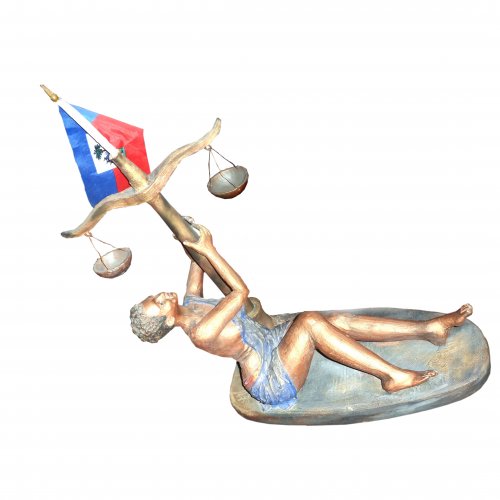Best Intellectual Property Lawyers in Port-au-Prince
Share your needs with us, get contacted by law firms.
Free. Takes 2 min.
List of the best lawyers in Port-au-Prince, Haiti
About Intellectual Property Law in Port-au-Prince, Haiti
Intellectual Property (IP) refers to creations of the mind, such as inventions, literary and artistic works, designs, and symbols, names, and images used in commerce. In Port-au-Prince, Haiti, IP laws protect the rights of individuals and businesses who create these intellectual assets. These laws regulate how these creations are used, shared, and protected.
Why You May Need a Lawyer
There are several situations where you may need a lawyer to assist you with Intellectual Property matters in Port-au-Prince, Haiti. These can include registering and protecting your patents, trademarks, or copyrights, resolving disputes over IP rights, drafting licensing agreements, or defending against infringement claims.
Local Laws Overview
In Haiti, IP rights are primarily governed by the Haitian Copyright Law of 2005 and the Industrial Property Law of 2006. These laws protect copyrights, patents, trademarks, and industrial designs. The National Office of Industrial Property (ONPI) oversees the registration and enforcement of these rights in Haiti.
Frequently Asked Questions
1. What is the process for registering a trademark in Port-au-Prince, Haiti?
Trademark registration in Haiti involves submitting an application to the ONPI, including information about the mark and its use. The process can take several months to complete.
2. How long does a copyright last in Haiti?
Copyright protection in Haiti lasts for the lifetime of the author plus 50 years after their death.
3. Can I use someone else's copyrighted work without permission?
Using someone else's copyrighted work without permission may constitute copyright infringement. It's best to seek legal advice before using someone else's work.
4. How do I enforce my intellectual property rights in Port-au-Prince, Haiti?
Enforcing your IP rights in Haiti can involve legal action through the courts. It's advisable to consult with a lawyer to guide you through the process.
5. What is the difference between a patent and a trademark?
A patent protects inventions or processes, while a trademark protects symbols, names, or designs used to identify goods or services.
6. Can I transfer my IP rights to someone else in Haiti?
Yes, IP rights can be transferred through licensing agreements, assignments, or other contracts.
7. What are the penalties for infringing on someone else's IP rights in Haiti?
Penalties for IP infringement in Haiti can include fines, damages, injunctions, and even criminal sanctions in some cases.
8. How do I determine if my invention is patentable in Haiti?
To determine if your invention is patentable in Haiti, you should consult with a patent attorney who can conduct a patent search and provide guidance on the patentability of your invention.
9. Can I register a domain name as intellectual property in Port-au-Prince, Haiti?
Domain names are not typically considered intellectual property in Haiti. However, they may be protected under trademark law if they qualify as a distinctive mark.
10. What steps should I take if I suspect someone is infringing on my IP rights in Haiti?
If you suspect someone is infringing on your IP rights in Haiti, you should document the infringement, seek legal advice, and consider sending a cease-and-desist letter to the infringer.
Additional Resources
For more information on Intellectual Property in Haiti, you can contact the ONPI or consult with a local law firm specializing in IP law.
Next Steps
If you need legal assistance with Intellectual Property matters in Port-au-Prince, Haiti, it's advisable to seek the help of a qualified IP attorney who can guide you through the complexities of Haitian IP laws and protect your intellectual assets.
Lawzana helps you find the best lawyers and law firms in Port-au-Prince through a curated and pre-screened list of qualified legal professionals. Our platform offers rankings and detailed profiles of attorneys and law firms, allowing you to compare based on practice areas, including Intellectual Property, experience, and client feedback.
Each profile includes a description of the firm's areas of practice, client reviews, team members and partners, year of establishment, spoken languages, office locations, contact information, social media presence, and any published articles or resources. Most firms on our platform speak English and are experienced in both local and international legal matters.
Get a quote from top-rated law firms in Port-au-Prince, Haiti — quickly, securely, and without unnecessary hassle.
Disclaimer:
The information provided on this page is for general informational purposes only and does not constitute legal advice. While we strive to ensure the accuracy and relevance of the content, legal information may change over time, and interpretations of the law can vary. You should always consult with a qualified legal professional for advice specific to your situation.
We disclaim all liability for actions taken or not taken based on the content of this page. If you believe any information is incorrect or outdated, please contact us, and we will review and update it where appropriate.
Browse intellectual property law firms by service in Port-au-Prince, Haiti
Port-au-Prince, Haiti Attorneys in related practice areas.








